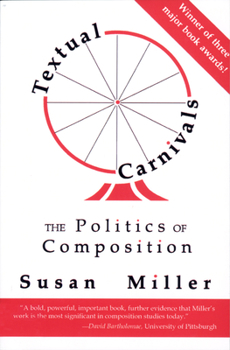Textual Carnivals: The Politics of Composition
Select Format
Select Condition 
Book Overview
This is the first book-length study of the status of composition in English studies and the uneasy relationship between composition and literature. Composition studies and institutional histories of English studies have long needed this kind of clarification of the historical and political contexts of composition teaching, research, and administration.
Susan Miller argues that composition constitutes a major national industry, citing the four million freshman-level students enrolled in such courses each year, the $40 million annual expenditure for textbooks, and the more than $50 million in teacher salaries. But this concrete magnitude is not expressed in political power within departments. Miller calls on her associates in composition to engage in a persistent critique of the social practices and political agenda of the discipline that have been responsible for its institutional marginalization. Drawing on her own long experience as a composition administrator, teacher, and scholar, as well as on a national survey of composition professionals, Miller argues that composition teachers inadvertently continue to foster the negative myth about composition's place in the English studies hierarchy by assuming an assigned, self-sacrificial cultural identity. Composition has been regarded as subcollegiate, practical, a how-to, and has been denied intellectual rigor in order to preserve literature's presentations of quasi-religious textual ideals.
Winner of three major book awards:
The Modern Language Association's Mina P. Shaughnessy Prize
The Conference on College Composition and Communication's Outstanding Book Award
The Teachers of Advanced Composition's W. Ross Winterowd Award





